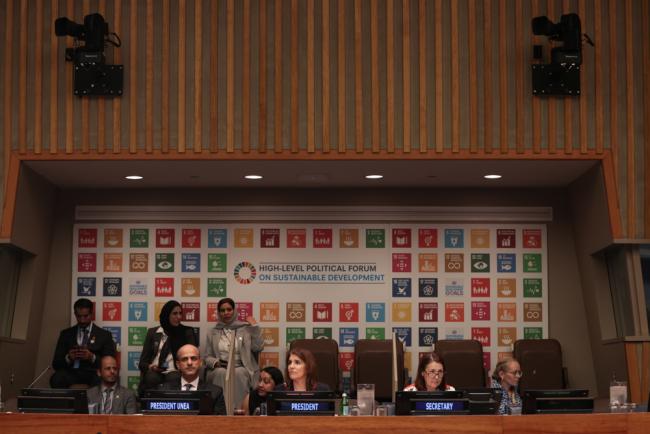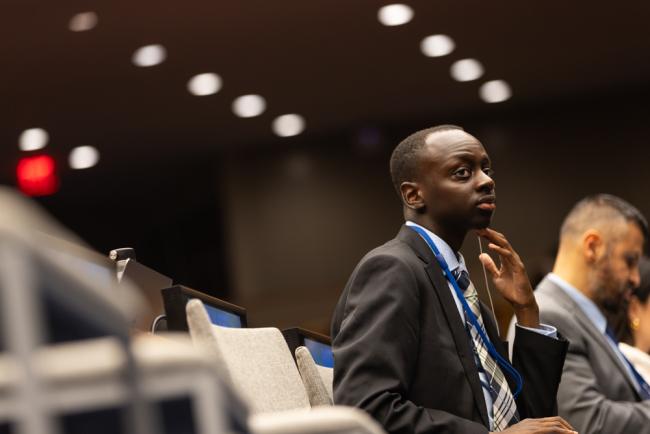"The world is at an inflection point.” This was the sobering reminder of the backdrop to the 2024 High-level Political Forum on Sustainable Development (HLPF), where countries have come together to address progress towards a more sustainable, just, and resilient future.
Want to dig deeper into today's talks? Read the full Earth Negotiations Bulletin daily report.
Across several high-level sessions held on Tuesday, delegates were reminded of the overlapping emergencies that afflict their regions, extending from the triple planetary crisis — climate change, biodiversity loss, and pollution — to foreign occupation, genocide, and conflicts. The commitment to achieving the Sustainable Development Goals (SDGs) in the face of these compounding crises was nonetheless emphasized throughout sessions sharing messages from the UN Environment Assembly (UNEA) and the five UN regions, and dialogues surrounding nine countries’ Voluntary National Reviews (VNRs).
Abdullah Bin Ali Amri, President, seventh session of UNEA, pointed to the role of UNEA in integrating the environmental dimensions of the 2030 Agenda with its socioeconomic ones, and in reinforcing the understanding that a healthy environment is an essential requirement and key enabler for sustainable development. He further underscored the ecocentric nature of delegates’ mandates, reminding them that they gather not only as Member States, “but as stewards of our planet, united by a common target to achieve the 2030 Agenda.”
Since the HLPF was created, the five UN Regional Commissions have organized annual Regional Forums on Sustainable Development to identify innovative pathways and review progress, challenges, and opportunities for accelerated SDG implementation.
Messages from the five regions reflected their various priorities. The Arab Regional Forum on Sustainable Development, for example, pressed home the peace, security, and justice dimensions, and called for comprehensive reform of the multilateral system, including implementation of a UN resolution on Gaza. The Africa Regional Forum underlined the impact of the debt burden and growing numbers of people living beneath the poverty line. The Economic Commission for Europe region placed emphasis on digitalization, youth engagement, and climate awareness, while the Latin America and the Caribbean region highlighted increased investment in social protection and international collaboration on biodiversity protection and disaster risk reduction.
Nine countries presented VNRs, with South Sudan and Yemen both presenting their first VNR report in the morning. In the afternoon, Guinea, Libya, and the Solomon Islands presented their VNR for the second time; Honduras and Costa Rica presented their third VNR; and Colombia and Sierra Leone presented their fourth VNR.
The focus on whole-of-society approaches in VNR processes was repeatedly highlighted, including:
- improved levels of women’s participation in the political sphere in South Sudan and Sierra Leone;
- civil society’s vital role in peacebuilding in Yemen;
- Colombia’s government-civil society dialogues;
- the importance of civil society participation in Guinea and Libya’s VNR processes; and
- solidarity actions aimed towards Indigenous and Afro-descendent communities in Honduras.
To receive free coverage of global environmental events delivered to your inbox, subscribe to the ENB Update newsletter.
All ENB photos are free to use with attribution. For HLPF 2024, please use: Photo by IISD/ENB | Kiara Worth.
Messages from the Regions

Radim Sršeň, Deputy Minister of Regional Development, Czechia, and Co-Chair, 2024 Regional Forum on Sustainable Development for the UNECE Region

Maritza Chan-Valverde, Permanent Representative of Costa Rica to the UN, and Forum of the Countries of Latin America and the Caribbean on Sustainable Development

Said Mohammed Al Saqri, Minister of Economy, Oman, and Chair, 2024 Arab Regional Forum on Sustainable Development

Ester-Anna-Liisa Shiwomwenyo Nghipondoka, Minister of Basic Education, Arts, and Culture, Namibia, and First Vice-Chair, Africa Regional Forum on Sustainable Development

Vahan Kostanyan, Deputy Minister of Foreign Affairs, Armenia, and Vice-Chair, 2024 Asia-Pacific Forum on Sustainable Development

José Manuel Salazar-Xirinachs, Executive Secretary, Economic Commission for Latin America and the Caribbean (ECLAC)
Voluntary National Reviews

South Sudan's VNR report highlights their progress in achieving SDG 16 (peace, justice, and strong institutions)

Sierra Leone's VNR report highlights progress made on SDG 3 (health and well-being) and SDG 4 (quality education)
































































